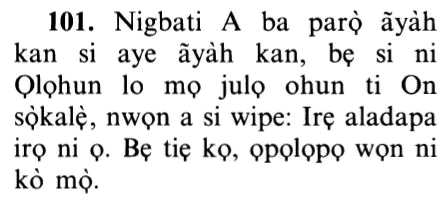16vs101
Select any filter and click on Go! to see results
وَإِذَا بَدَّلْنَا آيَةً مَّكَانَ آيَةٍ وَاللّهُ أَعْلَمُ بِمَا يُنَزِّلُ قَالُواْ إِنَّمَا أَنتَ مُفْتَرٍ بَلْ أَكْثَرُهُمْ لاَ يَعْلَمُونَ
Waitha baddalna ayatan makana ayatin waAllahu aAAlamu bima yunazzilu qaloo innama anta muftarin bal aktharuhum la yaAAlamoona
Yoruba Translation

Hausa Translation
Kuma idan Muka musanya wata ãyã a matsayin wata ãyã, kuma Allah ne Mafi sani ga abin da Yake saukarwa sai su ce: "Abin sani kawai, kai, maƙirƙiri ne." ôa, mafi yawansu bã sa sani.
Asbabu n-Nuzuul (Occasions of Revelation)
(And when We put a revelation in place of (another) revelationナ) [16:101-102]. This verse was revealed when the idolaters said: モMuhammad is mocking his Companions; one day he commands them to do something and the next day he forbids them from doing it, or brings instead something which is easier. He is nothing but a calumniator who says things of his own inventionヤ, and so Allah, exalted is He, revealed this verse and the verse after it.
The Idolators' Accusation that the Prophet was a Liar since some Ayat were abrogated, and the Refutation of their Claim
Allah says:
وَإِذَا بَدَّلْنَا آيَةً مَّكَانَ آيَةٍ وَاللّهُ أَعْلَمُ بِمَا يُنَزِّلُ قَالُواْ ...
And when We change a verse in place of another - and Allah knows best what He reveals - they (the disbelievers) say: "You (O Muhammad) are but a forger.''
Allah tells us of the weak minds of the idolators, and their lack of faith and conviction. He explains that it is impossible for them to have faith when He has decreed that they are doomed. When they saw that some rulings had been changed by being abrogated, they said to the Messenger of Allah:
... إِنَّمَا أَنتَ مُفْتَرٍ ...
You are but a forger,
meaning one who tells lies.
But Allah is the Lord Who does whatever He wills, and rules as He wants.
... بَلْ أَكْثَرُهُمْ لاَ يَعْلَمُونَ ﴿١٠١﴾
Rather, most of them know not.
... بَدَّلْنَا آيَةً مَّكَانَ آيَةٍ ...
And when We change a verse (of the Qur'an) in place of another,
Mujahid said:
this means, "We remove one and put another in its place.''
Qatadah said:
this is like the Ayah:
مَا نَنسَخْ مِنْ ءَايَةٍ أَوْ نُنسِهَا
Whatever verse We change (abrogate) or omit (the abrogated)...'' (2:106)
Allah said, in response to them:
يخبر تعالى عن ضعف عقول المشركين وقلة ثباتهم وإيقانهم وأنه لا يتصور منهم الإيمان وقد كتب عليهم الشقاوة وذلك أنهم إذا رأوا تغيير الأحكام ناسخها بمنسوخها قالوا لرسول الله صلى الله عليه وسلم " إنما أنت مفتر " أي كذاب وإنما هو الرب تعالى يفعل ما يشاء ويحكم ما يريد وقال مجاهد " بدلنا آية مكان آية " أي رفعناها وأثبتنا غيرها وقال قتادة هو كقوله تعالى " ما ننسخ من آية أو ننسها " الآية .
"وإذا بدلنا آية مكان آية" بنسخها وإنزال غيرها لمصلحة العباد "والله أعلم بما ينزل قالوا" أي الكفار للنبي صلى الله عليه وسلم "إنما أنت مفتر" كذاب تقوله من عندك "بل أكثرهم لا يعلمون" حقيقة القرآن وفائدة النسخ
قيل : المعنى بدلنا شريعة متقدمة بشريعة مستأنفة ; قاله ابن بحر . مجاهد : أي رفعنا آية وجعلنا موضعها غيرها . وقال الجمهور : نسخنا آية بآية أشد منها عليهم . والنسخ والتبديل رفع الشيء مع وضع غيره مكانه . وقد تقدم الكلام في النسخ في البقرة مستوفى
I'raab - grammatical analysis of the Qur'an
«وَإِذا» الواو استئنافية وإذا ظرف لما يستقبل من الزمان خافض لشرطه منصوب بجوابه.
«بَدَّلْنا آيَةً» ماض وفاعله ومفعوله الأول.
«مَكانَ» مفعول به ثان.
«آيَةً» مضاف إليه.
«وَاللَّهُ أَعْلَمُ» لفظ الجلالة مبتدأ وأعلم خبر والجملة اعتراضية لا محل لها.
«بِما» ما موصولية متعلقان بأعلم.
«يُنَزِّلُ» مضارع فاعله مستتر والجملة صلة.
«قالُوا» ماض وفاعله والجملة لا محل لها لأنها جواب إذا.
«إِنَّما» كافة ومكفوفة.
«أَنْتَ مُفْتَرٍ» مبتدأ وخبر والجملة مقول القول.
«بَلْ» حرف إضراب.
«أَكْثَرُهُمْ» مبتدأ والهاء مضاف إليه.
«لا يَعْلَمُونَ» لا نافية ومضارع مرفوع بثبوت النون والواو فاعل والجملة خبر وجملة أكثرهم إلخ مستأنفة.
